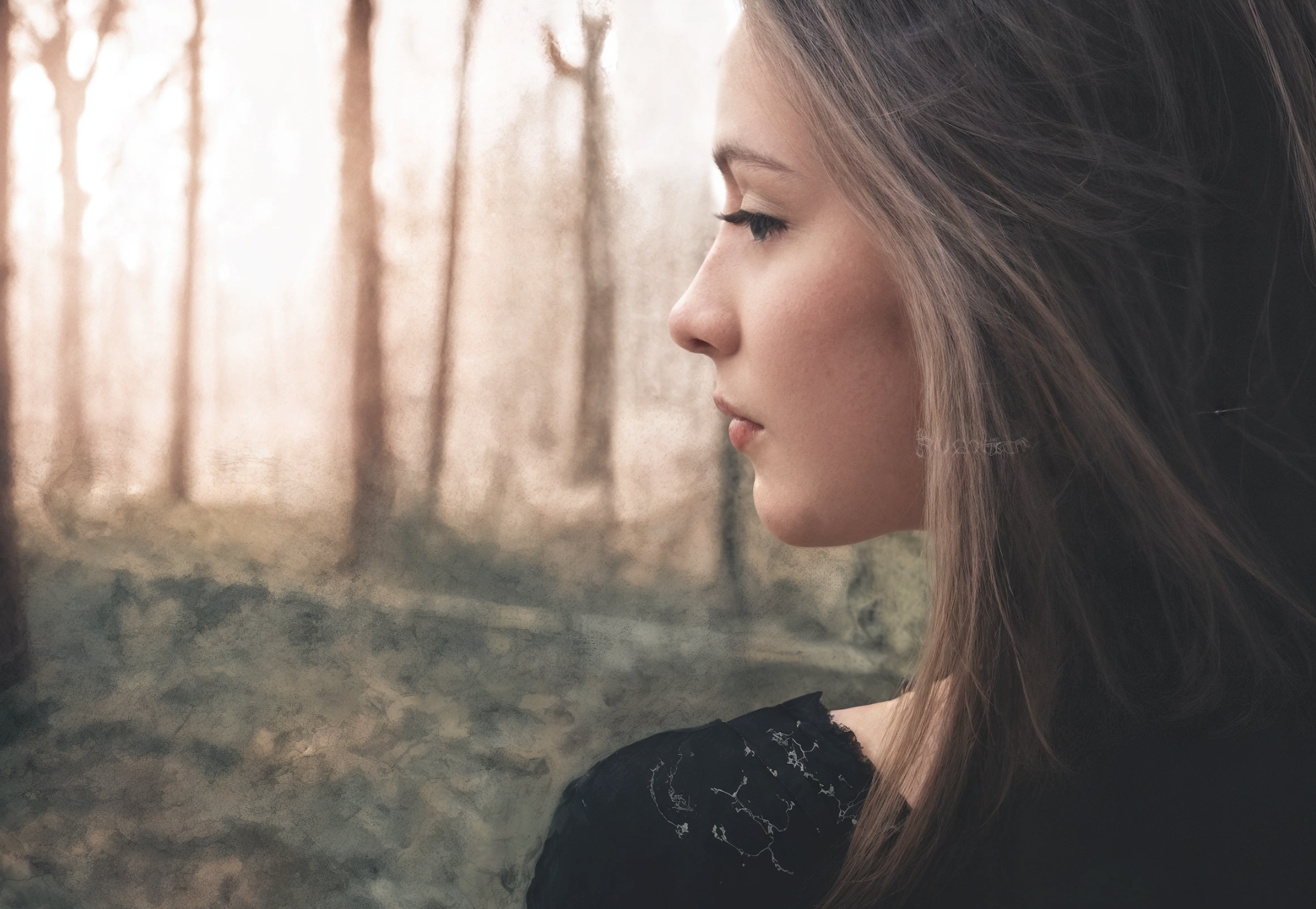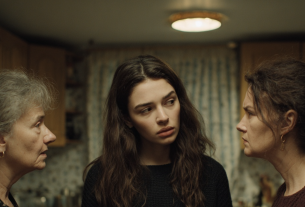The court was scheduled for Tuesday. Ulyana didn’t say a word about it, but Kostya could see she was nervous: she fiddled with the beads on her bracelet, bit her thin chapped lips, drank too much coffee. She didn’t ask him for anything, so it was pointless when her mother said Ulyana was using him for convenience. And that’s exactly why he decided to lie. He rehearsed for several days in front of the mirror, memorized all his lines. He just needed to warn her so no one would catch them lying.
“Ulya,” he called softly.
“Hm?”
“Let’s say tomorrow that you were with me that night?”
She lifted her transparent green eyes to him and asked, “Why? It’s not me who’s on trial.”
“You know. There’s no evidence, the case is falling apart. Then they’ll go after you again.”
That Ulyana was released was a miracle: everyone said she had killed her husband.
Kostya had known Ulyana since school. She was two grades ahead and didn’t notice Kostya. No, she was not the dream girl of all the boys: skinny, sharp-tongued, a little odd, as everyone said about her, she was a loner — wandering the school corridors, whispering something to herself. Vadik had already noticed her back then, everyone knew it: he bullied her, tripped her, laughed like a madman when she fell, and her skirt was lifted up to her waist. But later, in the senior classes, his tactics changed: Vadik beat anyone who dared to hurt Ulyana. Kostya wanted to do the same but couldn’t — he didn’t have the courage, nor muscles, nor the support like Vadik, who had strong friends just like him. Once Kostya tried to protect Ulyana when a classmate was bullying her, but he got beaten up himself.
That Ulyana married Vadik was incomprehensible. No doubt, Vadik was handsome, the kind of guy girls liked: tall, strong, with even white teeth and mischievous dimples on his cheeks. You should’ve seen how many fights girls had at the disco because of him! But Ulyana was different, not like everyone else; she couldn’t not see how rotten Vadik was inside.
Ulyana didn’t go to discos. She lived with her grandmother, who kept her under strict control, but even without that, she probably wouldn’t have gone. Kostya himself went: stood aside with other losers like himself, staring at girls. Kostya saw drunk Vadik groping girls, breaking noses of rivals, going crazy after the first shot of vodka. When Vadik ripped flowers in someone else’s front yard and left them on Ulyana’s porch, Kostya thought it was hypocrisy. But then he saw those flowers in a vase in Ulyana’s house. Maybe she didn’t know who they were from? Hardly, of course. After all, it was Vadik that Ulyana married.
When Ulyana was in her final school year, her father was released from prison. She was very little when he was jailed. Kostya knew this story from his parents and maybe that’s why he sympathized with Ulyana so much. He literally saw that scene as if on a TV screen: little Ulyana playing on the floor with a pyramid toy, her parents arguing, then the father grabbing a knife and…
Everyone feared her father when he came back. Even grandmother and Ulyana were afraid. That’s why she rushed into marrying Vadik — just to get away from home. Who knew it would be the same with Vadik: everyone knew he beat Ulyana. She couldn’t get pregnant, first for a year, then two, and they still had no children. Vadik shouted that it was Ulyana’s fault, that she was crazy. And he beat her.
Once Kostya gathered courage and approached Ulyana:
“Leave him. I can protect you.”
“You?” she laughed in his face. “He’d crush you with a finger, don’t talk nonsense.”
Probably Ulyana was right; Kostya was never strong or good at fighting. So he decided to change everything: every morning he did push-ups and pull-ups, took on the hardest physical work, and in half a year he grew stronger and matured. He approached Ulyana again, who was now always bruised and even once had a broken arm. She looked at him differently now: like a hunted animal that can’t find a way out.
“He won’t let me go,” Ulyana replied quickly. “No one can help me now.”
Kostya really wanted to save Ulyana but didn’t know how. And while Kostya was thinking of what to do (go to the police, call Ulyana’s husband for a talk — no, none of that worked), fate found the solution itself.
It had been raining for two weeks, and then the sun came out. The trees, already slightly golden, rustled, bending in the gusts of wind. It was a glorious day, everyone remembered it. And even more so the night, because the house where Vadik and Ulyana lived caught fire.
Kostya was already in bed when he first heard screams, then saw a bright light in the window, like a spotlight. He ran outside and froze when he realized where the fire was. His lungs burned as he ran — either from the acrid smoke or from a premonition of trouble. He immediately joined the human chain passing buckets of water, tried to get closer to the house, but the men stopped him.
“Where do you think you’re going, kid? You still need to live; see how the fire’s burning. Don’t get involved, you’re too small.”
No matter how Kostya looked for Ulyana, she was nowhere to be found. Neither was Vadik. When the fire truck arrived, the house was engulfed in flames and couldn’t be saved, but luckily it didn’t spread to the neighbors. People lingered for a long time, all talking about how tragic it was: so young, and such a terrible death.
And in the morning, Ulyana came out of the forest.
“I went mushroom picking,” she explained later. “And got lost. Walked for hours, realized I couldn’t get out of the forest by night, so I slept under a tree. And in the morning, I followed the sun and found my way out.”
Naturally, the police took her in: by that time it was known that Vadik had died before the fire started. His skull was fractured. His gun, ruby earrings that his mother gave to Ulyana at their wedding, and a cross inherited from his noble great-grandfather, passed down from father to son, were missing. It looked like a robbery, but who would rob their own in the village? So they decided Ulyana was involved, everyone knew Vadik beat her. Her mother-in-law was the first to slander her, telling everyone Ulyana had destroyed her son.
But a week later, Ulyana’s father got into a fight with a friend who had come from the city. The neighbors called the police, and in that friend’s pocket they found that very cross. He claimed he found it in the forest, but who would believe a criminal? Everything added up: he had no alibi and was already in prison for robbery. So the crime was pinned on him. No one doubted it was him: tiny Ulyana couldn’t have fractured the head of such a big man. The case went to court, but Mashka, who worked tirelessly at the local store and knew everyone’s business, said the case was falling apart because some witnesses saw the criminal in town that day. So he couldn’t have done it. Rumors swirled about Ulyana’s father, but he seemed uninvolved, grandmother claimed he was home. That’s why Kostya suggested to her they say she was with him.
By then, she was living with him. It just happened: Ulyana didn’t want to return to her father’s place — it was such a den of vice that even grandmother was afraid of his friends. And she had nowhere else to go. She came to Kostya herself and asked:
“Is your offer still on?”
And Kostya assured her it was and always would be. That she could live with him, and he wouldn’t touch her if she didn’t want him to. He freed a room for her and slept in the kitchen himself. The house was small, inherited from an uncle. But it was what it was. So they lived like neighbors, but everyone thought they were a couple, and Vadik’s mother shamed Ulyana all over the village, saying she hadn’t even buried her husband before she found another.
“They’ll understand why we’re doing this. I told them differently. And really, I was in the forest, you know.”
“I know. But they don’t care, just want the case closed. We’ll say it was shameful, not right to cheat on your husband. That’s why we hid it. You heard what Mashka said. What if he gets acquitted? They’ll attack you again.”
Ulyana looked at him intently and suddenly asked:
“Do you believe I didn’t do it?”
“Of course I do,” Kostya was surprised.
“And if it was me? What would you say?”
He didn’t answer immediately.
“I wouldn’t judge you,” Kostya finally said. “Everyone knows how he treated you. But still… that can’t be. And I don’t believe you could stoop to his level.”
At the trial, they lied. Kostya insisted; he didn’t want them to torment Ulyana anymore. And he was right: that man was acquitted. Ulyana and he were called in again for questioning separately, but they were so well coordinated that in the end, they left them alone.
A year later she invited him to her bed. That same autumn they got married. A year later a son was born, two years later a daughter. The son resembled Kostya, and the daughter neither of them: red-haired, freckled, with cornflower blue eyes.
“She looks like her mom,” Ulyana said. “I’ll show you now.”
She rummaged through boxes for a long time, pulled out an envelope from which faded photographs spilled out. Faded, with cut corners, but it was immediately clear the daughter really looked like Ulyana’s mother.
Those cut corners bothered Kostya for a long time, disturbed him. He couldn’t understand why, and when his wife wasn’t home, he found that envelope. He looked through all the photos again: yes, they were cut oddly — one corner on the left, another on the right, somewhere from below, somewhere from above. In all the photos was Ulyana’s mother, sometimes alone, sometimes with relatives. Ulyana clearly cut out her father; some photos were only halves.
Taking one in his hand, Kostya noticed the edge was blackened, as if… Kostya looked again — the photos were a bit uneven, bubbling in places, and at first he thought it was from age. But now he suddenly realized what was wrong with them.
He sat with them for a long time, then took scissors from the nightstand and cut off the burnt edge. After that, he put the photos back in the envelope, returned it to its place, and never thought about that envelope again…



